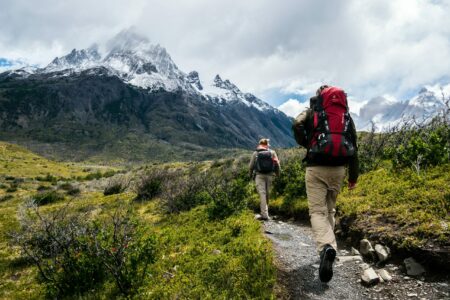Backpacking vs. Hiking: Understanding the Key Differences
Backpacking and hiking are two of the ways that many fo us explore nature, and take advantage of the beautiful state and national parks, recreation areas, and trails that are there for our benefit. Hiking and backpacking are like siblings — they are definitely related and look a lot alike, but they are also their own thing. We thought it might make sense to bring the topic to life a bit in this piece.
Backpacking is a more extended and immersive experience, and with more complicated gear selections. Backpacking allows outdoors-lovers to explore remote areas and spend several days in nature. Hiking, on the other hand, is a more contained that can be done in a few hours or a day. We would say it is more casual, but even a day hike can be physically challenging. Hikers can explore trails and enjoy the scenery without the need for extensive planning or preparation.
While both activities offer the opportunity to enjoy nature and get exercise, they require different levels of physical fitness, planning, and preparation. Backpacking requires more endurance, strength, and skill, as people must carry heavy loads and navigate challenging terrain. Hiking is a more accessible activity for people of all ages and fitness levels, as it can require physical exertion and preparation as long as you choose the right trail.
Understanding Backpacking
What is Backpacking?
You ever see someone at a trailhead headed into the forest with a huge pack on their back? Chances are they are backpacking. Backpackers can carry all their gear and supplies in a backpack while hiking and camping in remote areas. The activity can be a long daytrip, an overnight, or it can be long periods of time spent in the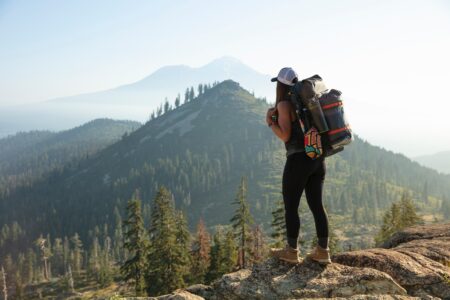 wilderness, away from civilization. Because of the potential duration, and the amount of gear carried, it requires a certain level of physical fitness and endurance. Backpacking is usually done on multi-day trips, and the route can vary from a well-maintained trail to a completely off-trail experience.
wilderness, away from civilization. Because of the potential duration, and the amount of gear carried, it requires a certain level of physical fitness and endurance. Backpacking is usually done on multi-day trips, and the route can vary from a well-maintained trail to a completely off-trail experience.
There are a few things about backpacking that make it truly unique:
- Backpackers carry all their gear and supplies in a backpack, which means that they need to pack light and efficiently.
- Backpacking usually involves camping in the wilderness, which requires knowledge of backcountry camping techniques and Leave No Trace principles.
- Backpacking often involves hiking really long multi-day distances, which requires a certain level of physical fitness and endurance.
Gear Needed for Backpacking
Backpacking requires a specific set of gear that is designed to be lightweight, durable, and functional. The following is a list of essential gear that every backpacker should have:
- Backpack: A high-quality backpack that fits comfortably and has enough space to carry all the necessary gear.
- Tent: A lightweight and durable tent that can withstand various weather conditions.
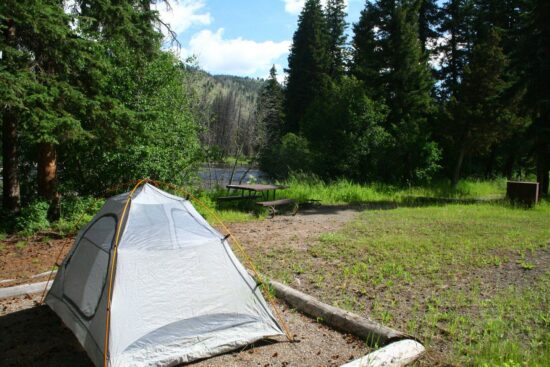
- Sleeping bag: A sleeping bag that is appropriate for the expected temperature range.
- Sleeping pad: A sleeping pad that provides insulation and cushioning.
- Stove and cookware: A lightweight camping stove and camp cookware for cooking meals.
- Water filter: A water filter or purification system for drinking water.
- Navigation tools: A map, compass, and GPS device for navigation.
- First aid kit: A first aid kit that includes basic medical supplies.
- Clothing: Appropriate clothing for the expected weather conditions, including rain gear, warm layers, and sun protection.
- Hygiene: Because you will be in the wild for a longer time, think about camp hygiene. You want to be able to clean yourself, your kitchen ware, and take care of basic human necessities.
Overall, backpacking is a challenging but rewarding activity that allows individuals to explore remote wilderness areas and experience nature in a unique and immersive way.
Understanding Hiking
What is Hiking?
If you are headed on to a trail without the gear to stay overnight, we call that hiking. Hiking can be pretty easy or it can be quite strenuous. Hiking can be done for various reasons, such as exercise, sightseeing, and relaxation. It can be a solo activity or done in groups, and it can range from short day hikes to multi-day backpacking trips.
There are a few things about hiking that we really like:
- Low cost: Hiking is a relatively low-cost activity as it requires minimal equipment and can be done in public parks or on public lands.

- Accessibility: Hiking trails can be found in many areas, making it an accessible activity for people of all ages and abilities.
- Physical benefits: Hiking is a great way to improve cardiovascular health, build muscle strength, and increase endurance.
- Mental benefits: Hiking can reduce stress, improve mood, and enhance cognitive function.
- Environmental awareness: Hiking can increase awareness of environmental issues and promote conservation.
- Easy prep: Unless you are headed into difficult terrain or bad weather, a hike can be done with relatively little prep.
Gear Needed for Hiking
While hiking does not require a lot of gear, having the right equipment can enhance the experience and ensure safety. Some essential gear for hiking includes:
- Comfortable and sturdy shoes: Hiking shoes or boots with good traction are essential for safety and comfort on uneven terrain.
- Clothing appropriate for the weather: Layers of clothing are recommended for hiking to adjust to changing temperatures.
- Backpack: A good backpack is needed to carry water, food, and other essentials.
- Navigation tools: A map, compass, or GPS device can help hikers stay on track and avoid getting lost.
- First aid kit: A first aid kit should be carried in case of injuries or emergencies.
Overall, hiking is a fun activity with a low barrier-to-entry that can provide a ton of physical and mental benefits.
Backpacking vs Hiking: Similarities and Differences
Similarities
Backpacking and hiking both use trail systems and lots of public land, and both involve hiking to some degree…. but backpacking takes it a step further. Both activities require appropriate gear and clothing, including sturdy footwear, weather-appropriate clothing, and backpacks. Additionally, both activities provide opportunities for exercise, fresh air, sun (or rain, if you are unlucky) and immersion in nature.
Differences
Despite their similarities, backpacking and hiking have some real differences.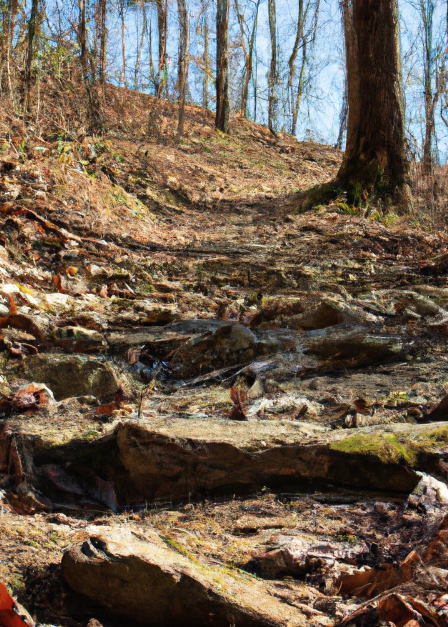
Hiking is typically a shorter, day-long or partial-day activity that involves walking on established trails. Hikers carry minimal gear and supplies, as they usually return to their starting point at the end of the day. They might have some water, bug spray, and a light coat, but maybe not much more. In contrast, backpacking involves carrying all necessary gear and supplies for an overnight or multi-day trip. Backpackers often venture off established trails and camp in remote locations.
Another key difference is the level of physical exertion required. Hiking is generally considered a moderate physical activity, while backpacking is more strenuous due to the added weight of gear and supplies. Backpackers typically cover more distance and face more challenging terrain than hikers. Backpackers also will likely need to hike several days in a row, so longer-term endurance is key.
In terms of planning and preparation, backpacking requires more extensive planning than hiking. Backpackers must plan for food, water, shelter, and safety for the duration of their trip. They must also be proficient in navigation and backcountry skills. Hikers, on the other hand, can often rely on established trails and amenities such as water sources and restrooms. They also need to anticipate potential weather changes.
A final note – Backpacking often includes other activities woven in to the experience. It can be common to backpack-in to a hunting location for game such as Elk, carrying your hunting gear and whatever type of bow or firearm you use. In other cases, backpacking is meant to get from one point to another, not returning to the original trailhead.
Choosing Between Backpacking and Hiking
When it comes to outdoor activities, hiking is way more common than backpacking, but both are great. While they share similarities, there are distinct differences between the two that may make one more appealing than the other. Here are some factors to consider when choosing between backpacking and hiking.
Factors to Consider
Duration of Trip
One of the most significant factors to consider is how long the trip will last. Backpacking typically involves longer trips, lasting several days or even weeks, while hiking is usually a day trip or even a partial-day trip. If you have limited time or prefer shorter trips, or are unsure about changing weather, hiking may be the better option.
Terrain and Difficulty
The terrain and difficulty of the trip are also essential factors to consider. Backpacking often involves more challenging terrain, such as steep inclines, rocky paths, and river crossings. Hiking, on the other hand, can involves more moderate terrain, such as well-maintained trails. With that said, though, you can choose a short hike that is really demanding, so don’t assume that all hikes are easy.
Gear and Supplies
Backpacking requires way more gear and supplies than hiking. You’ll need a backpack, sleeping bag, tent, cooking gear, and food, among other things. Hiking, on the other hand, requires less gear and supplies, making it a more accessible option for those who don’t want to invest in specialized equipment.
Personal Preference
Ultimately, the choice between backpacking and hiking comes down to personal preference. Some people enjoy the challenge and adventure of backpacking and truly being able to disconnect, while others prefer the simplicity and accessibility of hiking. Consider your goals, experience level, and comfort level when making your decision.
Regardless of which option you choose, both backpacking and hiking offer opportunities to explore the great outdoors, get exercise, and connect with nature.
Safety Tips for Both Backpacking and Hiking
When it comes to outdoor activities like backpacking and hiking, safety should always be a top priority. Whether you’re a seasoned adventurer or a beginner, it’s important to be prepared for any situation that may arise. Here are some safety tips to keep in mind for both backpacking and hiking.
Backpacking Safety Tips
When backpacking, it’s important to carry the right gear and be prepared for the unexpected. Here are some safety tips to consider:
- Plan ahead: Before embarking on a backpacking trip, make sure to research the area and check the weather forecast. Let someone know where you’re going
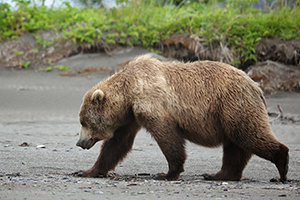 and when you plan to return.
and when you plan to return. - Pack the essentials: Bring a map and compass, first-aid kit, extra food and water, and a multi-tool. Don’t forget to pack warm clothing and rain gear, even if the forecast is sunny.
- Stay on the trail: Stick to marked trails and avoid shortcuts or off-trail hiking. This can help prevent accidents and minimize damage to the environment.
- Be aware of wildlife: Keep a safe distance from wildlife and never feed them. Store food and garbage securely to avoid attracting animals. If you are in an area with known predators, consider carrying some bear spray.
- Know your limits: Don’t push yourself too hard and take breaks when needed. If you’re feeling tired or unwell, it’s better to turn back than to risk injury.
- Check the conditions: Before heading out on a hike, check the weather forecast and trail conditions. Avoid hiking in extreme weather conditions or on trails that are beyond your skill level.
- Travel in a group: Hiking with a partner or group can be safer than hiking alone. Make sure everyone in your group is prepared and knows the trail plan.
Remember, safety should always be your top priority when backpacking or hiking. By following these tips and being prepared for the unexpected, you can enjoy a safe and enjoyable outdoor adventure.
Frequently Asked Questions
What is a thru hiker and how does it differ from a backpacker?
You might often hear the term “thru-hiker.” A thru hiker is someone who hikes a long-distance trail from start to finish in one continuous journey. This can take several months to complete, such as with the Appalachian Trail. Thru hikers typically carry lighter gear and rely on resupplying at towns along the trail, but may also have backpacks with food for those days when they will not be near civilization.
How do hiking boots differ from backpacking boots?
They are basically the same. There are all types of hiking boots for many situations. Whether backpacking or hiking, be sure to choose the boot or shoe that is best-suited for your expected terrain.

